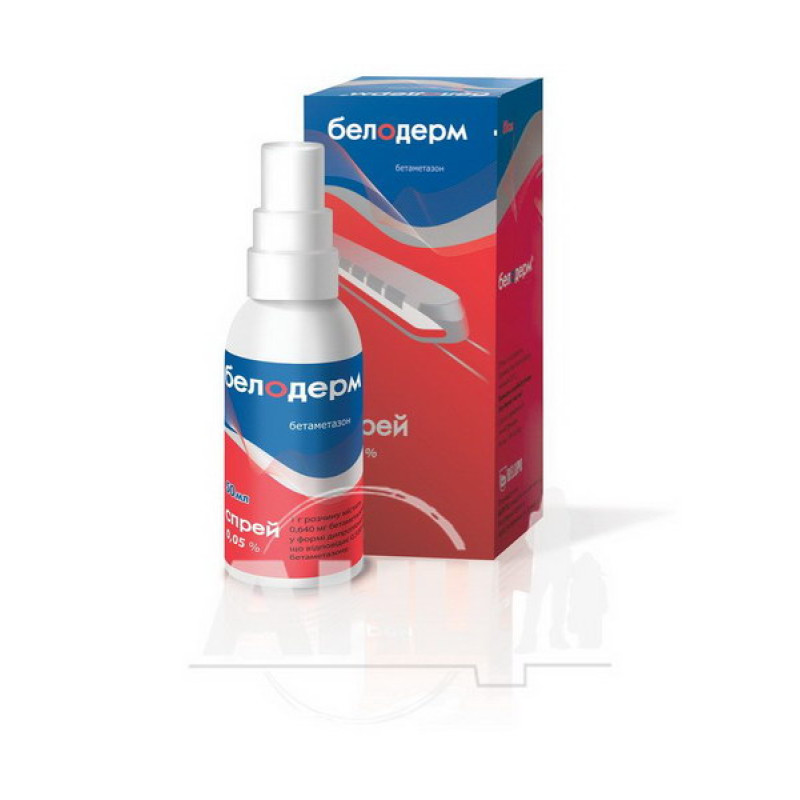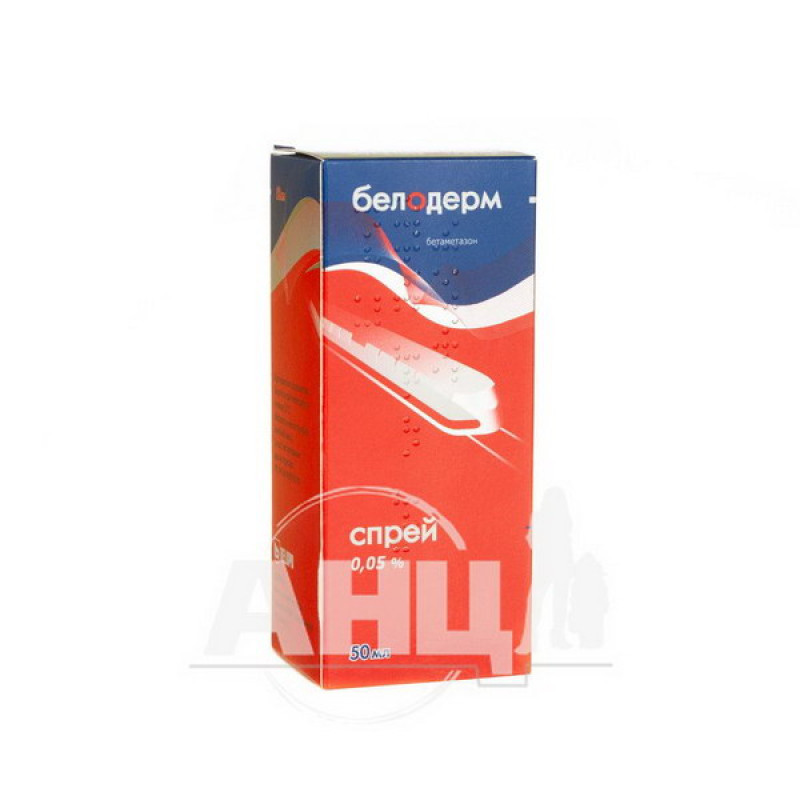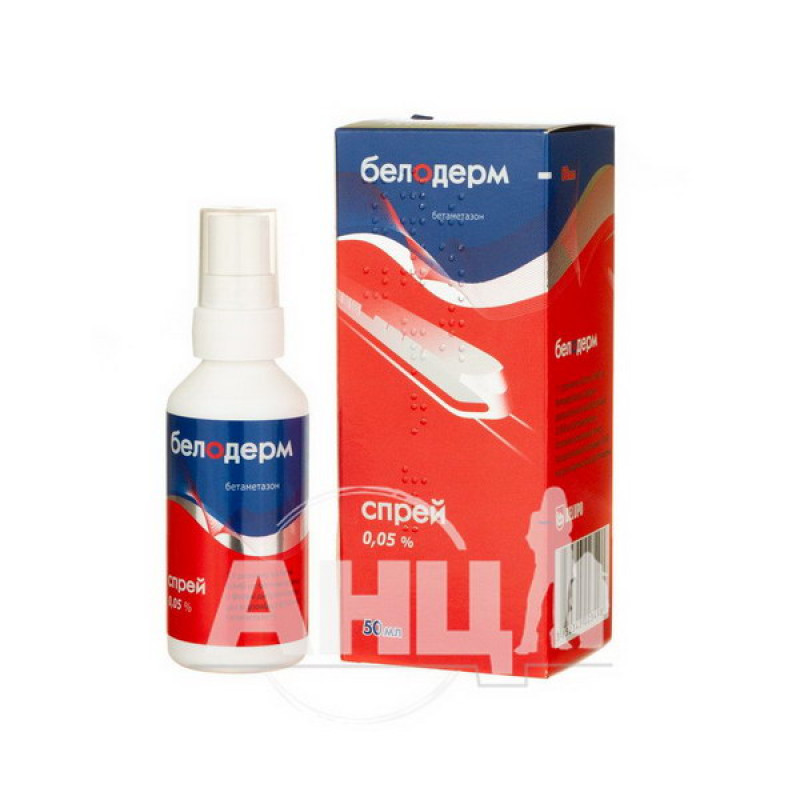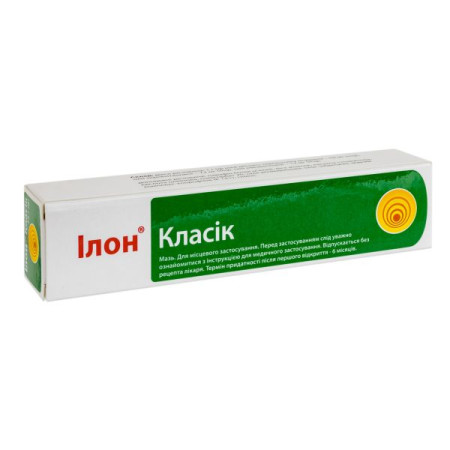Beloderm spray 0.05% bottle 50 ml

Instructions Beloderm spray 0.05% bottle 50 ml
Composition
active ingredient: betamethasone dipropionate;
1 g of solution contains 0.640 mg of betamethasone in the form of dipropionate, which corresponds to 0.500 mg of betamethasone;
excipients: isopropyl alcohol, carbomer 934P, sodium hydroxide, purified water.
Dosage form
Spray 0.05%
Main physicochemical properties: colorless, transparent to slightly opalescent, viscous solution with the odor of isopropanol.
Pharmacotherapeutic group
Corticosteroids for use in dermatology. Active corticosteroids (group III).
ATX code D07A C01.
Pharmacological properties
Pharmacodynamics
Betamethasone, a synthetic glucocorticoid for external use, exhibits high glucocorticoid activity and minimal mineralocorticoid effect. It has a strong anti-inflammatory, antipruritic and vasoconstrictor effect. Due to this, it is used to treat dermatoses sensitive to the action of corticosteroids.
Pharmacokinetics
When applied topically, betamethasone may be absorbed to a lesser extent by normal, undamaged skin, systemic absorption of corticosteroids is expected only under adverse conditions (prolonged treatment, occlusive dressing). After penetration into the skin, the pharmacokinetic profile of topical corticosteroids is similar to that of systemic corticosteroids.
Corticosteroids bind to plasma proteins to varying degrees, are mainly metabolized in the liver and excreted in the urine.
Some topical corticosteroids and their metabolites are excreted in the bile.
Indication
Topical treatment of dermatoses sensitive to glucocorticosteroid therapy.
Contraindication
Hypersensitivity to betamethasone or to other corticosteroids or to other components of the drug. Viral infections, including post-vaccination reactions and chickenpox; viral skin infections (e.g. herpes simplex, shingles, chickenpox); acne rosacea; rosacea-like (perioral) dermatitis; bacterial dermatoses, including tuberculosis and syphilis of the skin; fungal diseases, ophthalmological diseases (Beloderm is not intended for ophthalmic use); do not use under occlusive dressings (plaster). Particular caution should be exercised when applying Beloderm to the skin of the face. Do not allow the drug to get into the eyes or mucous membranes. Do not use during pregnancy. Long-term treatment and/or application to large skin surfaces should be avoided, as absorption of the active substance is possible.
Interaction with other medicinal products and other types of interactions
Not detected.
Application features
Beloderm is generally well tolerated, but treatment should be discontinued if irritation or hypersensitivity occurs. If a hypersensitivity reaction or skin irritation develops, the drug should be discontinued immediately and the patient should be given adequate therapy. In the presence of infection, appropriate antifungal or antibacterial agents should be prescribed. If the desired effect does not occur quickly, the use of corticosteroids should be discontinued until the signs of infection have resolved.
Beloderm is not intended for use in ophthalmology. If the drug is applied to the skin near the eyes, it is necessary to carefully monitor that the drug does not get into the eyes, due to the possible development of cataracts, glaucoma. In patients with facial skin lesions, the course of treatment should not exceed 5 days.
Systemic absorption of topical corticosteroids generally increases with corticosteroid dosage, duration of treatment, and the size of the body surface area treated. Therefore, corticosteroids with high potency should be used on large areas of skin under careful and periodic monitoring of the hypothalamic-pituitary-adrenal (HPA) axis. If HPA suppression occurs, the drug should be discontinued, the frequency of application reduced, or the patient switched to a less potent corticosteroid. HPA function usually recovers upon discontinuation of the drug.
In rare cases, withdrawal symptoms may develop, requiring the addition of a systemic corticosteroid.
Do not apply the solution to erosive, weeping areas or to skin cracks (abrasions) and ulcers. Prolonged use of the drug (more than 3-4 weeks), as well as high dosages (application to large areas) should be avoided.
Use during pregnancy or breastfeeding
There are no clinical studies of topical corticosteroids in pregnant women. Topical treatment of pregnant women with corticosteroids is not recommended (especially in the first trimester), except in cases where the expected benefit outweighs the risk to the fetus.
It is currently unknown whether topical corticosteroids can be excreted in breast milk due to systemic absorption, therefore a decision to discontinue breastfeeding or discontinue the drug should be made taking into account the importance of the treatment to the mother and the risk to the child.
Ability to influence reaction speed when driving vehicles or other mechanisms
Usually, the drug does not affect the patient's reaction speed when driving or working with other mechanisms.
Method of administration and doses
Beloderm, cutaneous spray should be applied 2 times a day from a distance of about 5 cm, by one or two presses, spraying onto the affected area of the skin or scalp and rubbing in thoroughly. The volume of solution released with one press is 0.1 ml.
When treating some patients, it is sufficient to apply the drug less frequently to maintain its effect.
The recommended duration of treatment should not exceed two weeks. The maximum weekly dose is 50 ml.
Prolonged use of Beloderm or application of the spray to large areas (more than 20% of the body surface) should be avoided. This includes treatment of more than 10% of the body surface for more than 1 week.
After clinical improvement, the use of a weaker glucocorticosteroid is often recommended.
The development of manifestations of systemic effects of the drug should be carefully monitored.
The method of application should be adapted to the skin type and stage of the disease.
For dermatoses associated with bacterial infection, targeted antibacterial therapy should be used. Patients with dermatoses of fungal origin require special treatment.
Do not use under occlusive dressings, as the side effects of the drug may be increased.
Children
There are no clinical data on the use of the drug in children, therefore it is undesirable to use it in patients of this age category. It is not recommended for use in children under 12 years of age.
Because children have a greater surface area to body weight ratio than adults and drug absorption is more active, they are more susceptible to suppression of the hypothalamic-pituitary-adrenal (HPA) axis by corticosteroids and to the development of exogenous corticosteroid effects.
Overdose
Excessive or prolonged use of topical corticosteroids may cause suppression of pituitary-adrenal function, leading to secondary adrenal insufficiency and symptoms of hypercorticism, including Cushing's syndrome. Acute symptoms of hypercorticism are usually reversible.
In case of overdose, appropriate symptomatic treatment is indicated. If necessary, correction of electrolyte balance should be carried out. In case of chronic toxic effects, gradual withdrawal of the corticosteroid is recommended.
Adverse reactions
Frequency of side effects:
very common (≥1/10);
common (≥1/100-<1/10);
uncommon (≥1/1000-<1/100);
rare (≥1/10,000-<1/1,000);
very rare (≥1/10,000);
not known (frequency cannot be estimated from the available data).
Skin and subcutaneous tissue disorders.
Common: burning, itching, irritation, dry skin, folliculitis, hypertrichosis, acneiform rash, hypopigmentation, steroid acne, rosacea-like (perioral) dermatitis, skin tingling, skin induration, skin cracking, feeling of warmth, flaky skin, focal skin peeling, follicular rash, erythema, telangiectasia, skin maceration, skin atrophy, striae, allergic contact dermatitis.
Infections and invasions.
Often - secondary infection, especially under an occlusive dressing.
Endocrine system disorders.
Rarely - adrenal insufficiency.
Hypersensitivity reactions are possible in patients with individual intolerance to any component of the drug.
When applying the drug to large surfaces or with an occlusive dressing, especially for a long period, it is necessary to bear in mind the possibility of developing systemic effects of the drug.
Any adverse events observed with systemic use of glucocorticoids, including adrenal suppression, may also occur with topical use of glucocorticoids.
Expiration date
2 years.
Storage conditions
Store at a temperature not exceeding 25 °C.
Keep out of reach of children.
Packaging
20 ml or 50 ml in a bottle with a mechanical pump sprayer. 1 bottle in a cardboard box.
Vacation category
According to the recipe.
Producer
Belupo, medicines and cosmetics, d.d., Croatia
Location of the manufacturer and its business address
48000, Koprivnica, Danica Street, 5, Croatia.
There are no reviews for this product.
There are no reviews for this product, be the first to leave your review.
No questions about this product, be the first and ask your question.


















